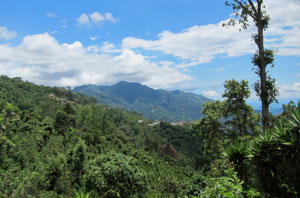In 2012, sustainably-grown coffee rose to 4.5% of global production, rising 45% from the previous year.
That may not sound like much, but coffee is one of the world’s most traded commodities – 4.5% equals 375,000 metric tons.
Companies that sell sustainable coffee include McDonald’s USA and McDonald’s Canada, Caribou Coffee, Second Cup, Green Mountain Coffee and Nespresso – grown on farms certified by the Rainforest Alliance.
"By choosing to source coffee from Rainforest Alliance Certified farms, companies are having demonstrable impacts
on the ground, conserving natural resources and improving the lives and livelihoods of farm communities," says Tensie Whelan, president of the Rainforest Alliance. "More and more companies are realizing that sustainable certification also makes good business sense, ensuring long-term viability of supply-chains."
Last month, McDonald’s
USA announced it requires suppliers to source all espresso beans from certified coffee farms. A majority of its restaurants in Europe and all of them in Australia and New Zealand serve certified coffee.
Caribou Coffee is the first major US coffeehouse to source 100% certified coffee and Second
Cup sources over 90%.
Over 118,000 coffee farms covering almost 800,000 acres
are now Rainforest Alliance Certified, meeting rigorous environmental and social best practices – that means stopping deforestation, protecting wildlife, managing waste and cutting use of chemicals.
Coffee growing region in Guatemala:

Last year, certified tea reached 9.4% of global production and 2.7 million acres of farmland.
Coffee And Climate Change
Growing coffee sustainably has become even more important in the face of climate change – rising temperatures are spreading a deadly fungus that is decimating coffee crops around the world.
"Coffee is the canary in the coal mine for climate change," Ric Rhinehart, executive director of the Specialty Coffee Association of America, told US News. "If you can’t think about the long term risk for planetary impacts, think about the short term risk for your coffee. Know that a day without coffee is potentially around the corner."
Last month, Starbucks bought its first coffee farm to up its production of sustainably grown coffee, while researching climate change-resistant varieties.
Arabica bean is at greatest risk, the kind of coffee most people drink. Nearly all the places it’s grown in the wild – mostly Ethiopia, Uganda and Kenya – could be unsuitable for the plant by 2080, reports US News.
The same is true in South and Central America, where Arabica is cultivated. Within 20 years, coffee may have to be grown in the Northern Hemisphere, endangering 26 million jobs.
"Arabicas are the ones at risk-they’re very delicate trees," Tim Schilling, executive director of the World Coffee Research Center, told US News. "They depend on conditions that are not too warm, not too cold, not too wet, not too dry."
Besides needing near-perfect conditions to grow, Arabica is also highly vulnerable to the fungus, coffee leaf rust, which has spread from Africa and Asia to every coffee-growing region except Hawaii and Australia. Infected trees die from the fungus and can completely destroy a country’s crop.
"For decades, coffee farmers in South and Central America were insulated from the disease’s effects because coffee plants in the Americas are grown in the cool mountains, where temperatures weren’t warm enough to be suitable for the plant. But in the 1970s, the first cases of coffee rust reached Brazil, and increasing temperatures and rainfall caused by climate change have allowed the fungus to live at higher altitudes," says US News.
Guatemala’s President declared a state of emergency in February after 70% of coffee plants had the disease. It could reduce production there 40% over the next year, and the same is true for neighboring countries.
Here’s a list of products that are certified by Rainforest Alliance:
